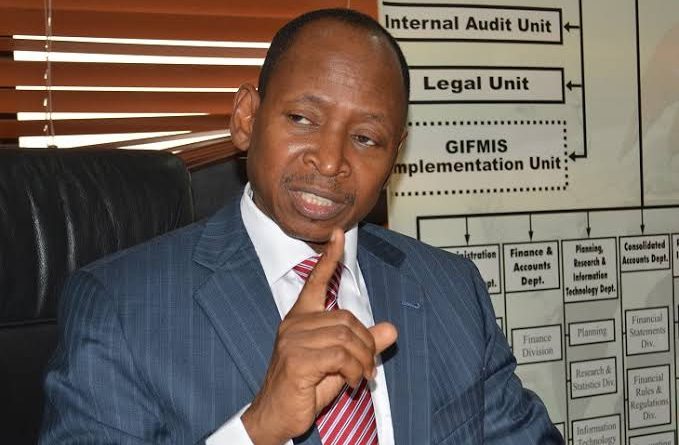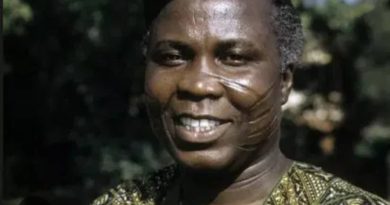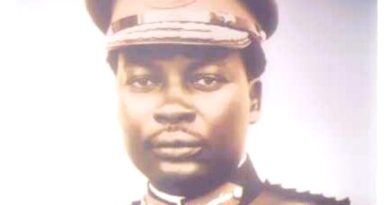Has Buhari Won Or Lost The Corruption War? By Bola Bolawole
turnpot@gmail.com 0807 552 5533One of the three pillars on which the retired Major-General Muhammdu Buhari hung his return to power as president and commander-in-chief in 2015 was that he would fight and uproot corruption. The other two were that he would end insurgency and insecurity as well as revamp the economy. As the nation begins the processes of electing Buhari’s successor, it is apt to find out how well or otherwise has Buhari fared. This is the task attempted here today by a conscientious Nigerian academic and public affairs analyst, Professor Babafemi Badejo, who is not new to readers of this column. Titled ”Our President and The Corruption Feast in Abuja” Badejo, a former Deputy Special Representative of the UN Secretary-General for Somalia; Solicitor and Advocate of the Supreme Court of Nigeria; and Professor of Political Science/International Relations, Chrisland University, Abeokuta, Nigeria, zeroed in on Buhari’s touted war against corruption but what marks did he award the president? Find out!“I visited Abuja on April 29, 2022 to witness the marriage of my nephew, Adeniyi Shonibare, with Imoleayo Olotinbia. It was a very interesting process for a union. The three pivotal highlights of the marriage ceremony: Traditional, Church Service, and Reception, which took place over two days, were held at the C.C.C. Luli Cathedral, Kado Life Camp, Abuja. The bride and groom’s parents are staunch Celestials and the Church premises provided adequate space for the events, thus saving the family the excessive costs of rented halls.We stayed at Jabi and had to drive to the Church premises. I was dazed to see the insane driving style in Abuja. I used to think driving in Lagos was gross but my Abuja experience this time around showed the general lawlessness in the country. Traffic lights were ignored. Lacking the dexterity of order in the disorder of Lagos, it was hellish. What should have taken us seven minutes took well over 30!The marriage ceremony itself was spectacular. I know that the Celestial Church of Christ (C.C.C.) people, especially the women, dance vivaciously inside their nice, white flowing gowns without footwears but the extent of gyrations to rap tunes, some of which extolled the vices of Yahoo Yahoo boys, was unbelievable. The ecstatic joy, especially from dancing, is probably part of the allure that has made the C.C.C. survive far beyond the death of its founder.I seldom visit Abuja, the political capital and most important seat of corruption in Nigeria. Of course, Lagos, where I live, is not a city of saints. The fact is that Nigerians pay less attention to sordid corruption at levels lower than the federal government’s. The law hardly catches up with the sordid corruption of most Chief Executives and operatives at the state and local government levels. After all, the oil proceeds that make up the bulk of the wealth of Nigeria are shared from Abuja. This fact has made political offices the most lucrative business ventures in Nigeria – a shortcut to immense wealth accrued without sweat.An election season like we have now is also a period when aspirants move bags of money around in Abuja unhindered within the “shifting alliances of thieves” called political parties in Nigeria. Selections of the highest bidders and investors euphemistically called elections are outrageously expensive, far beyond the reach of legitimate earnings but once in office, Nigerians marvel when those “investors” steal billions in naira and or dollars from public funds as returns on “investment”!Dr. Reuben Abati, in his piece titled “The Spiritual Side of Aso Villa”, shocked me when he started explaining Nigeria’s national leadership deficit as spiritual problems. He conjured images of demons and spirits walking with head upside down at Aso Villa, writing as a re-incarnation of our great Yoruba literary giant, D.O. Fagunwa, who entertained us with such stories in “The forest of a thousand demons”. Definitely, Dr. Abati was merely “shading the truth, grey”. He was only trying to shift the blame for the incompetence at Aso Villa to the realm of the spiritual. How can one, for instance, hold witches and wizards responsible for the corrupt, myopic, and retrogressive decisions like searching for colonial era cow routes when cities have been built along those routes!Buhari told his Nigerian compatriots a major truth when he said: “if we don’t kill corruption, corruption will kill us”. Even the African Union rewarded him for this campaign zeal by making him the champion for anti-corruption on the continent of Africa in January 2016. But PMB no longer pretends to fight corruption, even as he commences his eighth year in office as President of Nigeria.. PMB once had policies that raised hopes his administration wanted to make a dent against corruption. In the beginning, the Ibrahim Magu-led Economic and Financial Crimes Commission (EFCC) embarked on the punitive orientation and succeeded in getting jail terms on ongoing as well as new cases of corruption. Among these were the clamping in jail of governors Jolly Nyame and Joshua Dariye of Taraba and Plateau states respectively. Measures like the Treasury Single Account (TSA) and an initial zeal to implement the National Anti-Corruption Strategy (NACS) gave hope.Though Ibrahim Magu was selective on which cases he prioritised for prosecution, he appeared to want to make a dent before he crossed the path of the Attorney-General and was cut to size. After Magu, came a seemingly more proactive, young Abdulrasheed Bawa who was appointed in February 2021 with Magu’s suspension still unresolved. Bawa recently noted that the commission had secured the conviction of 978 persons within one year. However, the EFCC’s records of conviction show that most of the persons convicted were cybercrime criminals (also known as Yahoo Yahoo boys). The high and mighty, especially those close to the presidency, tend to face foot-dragging by the EFCC and the Independent Corrupt Practices and other related offenses Commission (ICPC). This position was buoyed by a US Department of State report titled “2021 Country Reports on Human Rights Practices in Nigeria” which corroborated The Civil Society Legislative Advocacy Centre (CISLAC), showing how the two major anti-corruption agencies only target low- and middle-level officials suspected of corruption. According to the report, despite the charges brought against serving and former high-level officials by the EFCC and ICPC, the organisations focused more on low- and middle-level corrupt officials in 2021.We used to hear accounts of how the TSA was helping to curb corruption – but not anymore. The NACS that came out of a UN convention was abandoned after the Attorney-General had named an implementation committee in September 2018. Before the 2019 election, Adams Oshiomhole, chairman of the ruling party, stated that any “sinner” would have his/her sins forgiven if he/she joins the ruling party! Indeed, the ruling party and President Buhari started openly embracing people under investigation for corruption to join those whose corruption cases were shoved aside and made Ministers. PMB who had promised to avoid any person who was tainted asked Nigerians to show him the conviction of anyone he so appointed! The Attorney-General filed a discontinuance of the trial (nolle prosequi) of the former Gombe State Governor, Senator Danjuma Goje, who ruled Gombe from 2003 to 2011, and another fellow both of whom had faced charges for selling 50 buses belonging to the state. The administration dilly-dallied as other cases were handled with kid gloves until some of them became Governors in 2019 and automatically received immunity from prosecution.Nothing better demonstrates that PMB has acquiesced that corruption can strangulate Nigeria than the recent controversial pardon granted to Rev. Jolly Nyame, governor of Taraba state from 1999 to 2007, who was serving a jail term for having misappropriated public funds as well as Mr. Joshua Dariye, who governed Plateau State from 1999 to 2007 and was serving a jail term for stealing two billion naira of public funds. The trial of the two former governors was touted as examples to teach lessons that no one is above the law. The cases went through a lot of court processes with their respective jail terms finally confirmed by the Supreme Court of Nigeria.The EFCC recently arrested Alhaji Ahmed Idris, the Accountant-General of the Federation, for raking unto himself 80 billion naira from the national patrimony. The same EFCC is yet to indicate if it would dig into the stories surrounding the alleged distribution of cars for gubernatorial elections in Kebbi state; not to talk of how friends and groups were just coming up with 100 million naira to purchase presidential primary election forms for presidential aspirants. Unfortunately, one of these aspirants will take over from Buhari!The truth remains that under the PMB-led administration, corruption has been allowed to fester. One presidential aspirant boasted about how he would use technology to solve the problem of corruption but, I dare say, that this proposal is a wrong diagnosis of the problem. Technology has helped to name so many in the Panama and Paradise papers. How many have been questioned and brought before the courts? Pandora papers have also given more information: what has happened?With impunity and the absence of the rule of law, corruption will continue to fester”.Well said, Prof.! But with Sai Baba not the messiah he was touted to be, who, then, will save Nigeria?




